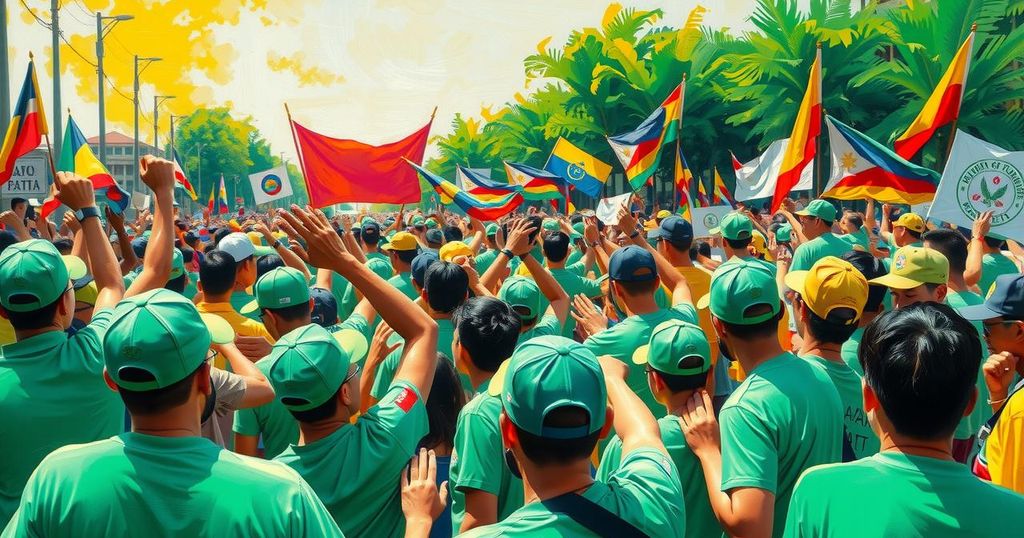Duterte’s Political Legacy Endures Amid Legal Woes in ICC Detention
Despite being detained and facing charges of crimes against humanity, former President Rodrigo Duterte remains a popular figure in the Philippines, leading in early election results for mayor of Davao City. His arrest has sparked division in public opinion, with some viewing him as a victim of political persecution. Duterte’s family continues to exert political influence, while his daughter looks like a future candidate herself. The upcoming summer hearings may determine his and his family’s political fates.
DAVAO CITY, Philippines – In a peculiar twist of events, former President Rodrigo Duterte, who is currently in custody at the International Criminal Court (ICC) in The Hague, seems to be maintaining a stronghold back home. Six weeks ago, a van loaded with flowers arrived at the ICC’s detention center, prompting a flood of birthday cards for Duterte, who celebrated his 80th birthday on March 28. This outpouring of support, despite the serious accusations against him – specifically, crimes against humanity related to his anti-drug campaign – highlights his undiminished popularity among many Filipinos.
Duterte’s lawyer, Mr. Nicholas Kaufman, noted in a recent interview, “The place was inundated with flowers… I brought some of the mail out because they didn’t know what to do with it.” Meanwhile, on the streets of Davao City, thousands donned the green color associated with Duterte’s political party, signaling strong backing as midterm elections approach on May 12.
Current unofficial election results indicate a significant lead for Duterte in the mayoral race; by 11:30 p.m., preliminary counts showed he held 63.3% of the vote, a considerable margin over his nearest rival, Karlo Nograles, who garnered only 7.8%. Although Duterte faces the possibility of life imprisonment if convicted, his political legacy appears robust, with many expecting him to return to his previous mayoral role in Davao.
The situation surrounding Duterte’s legal troubles has polarized public opinion in the Philippines. Recent polls reveal that while many support the investigation against him, significant factions perceive his arrest as politically motivated, particularly against the backdrop of his relationship with sitting President Ferdinand Marcos Jr. – once an ally of Duterte’s family. Notably, Marcos’ approval ratings suffered a decline following Duterte’s detainment, dropping from 42% to 25%. In contrast, the approval ratings of Duterte’s daughter, Vice President Sara Duterte, surged to 59%.
Sara Duterte, viewed as a potential presidential candidate in the future, faces serious accusations herself, having been impeached on multiple charges, including corruption and involvement in the controversial drug war. This election is crucial, as the outcomes could influence her political path heavily.
In Davao, the Duterte family continues to solidify their political influence. Preliminary results indicate that his son, Sebastian Duterte, is likely to win the vice-mayoral position, potentially continuing the family’s governance. A coalition of rival political families has formed to challenge the Dutertes, but even Bernie Al-ag, a former vice-mayor and one of Sebastian’s challengers, expressed personal affection for Rodrigo Duterte: “I also look at him as a father figure.”
Concerns arose among some candidates, including NGO worker Mags Maglana, who feared that the sympathy for Duterte might transfer to his family during the elections; she received only 0.3% of the votes as of the latest counts. Duterte’s supporters have leveraged the legal proceedings against him as part of their campaign, and a rally on May 8 featured a video of his arrest, with slogans like “BRING HIM HOME” being ubiquitous.
Life for Duterte in detention, far from the familiar surroundings of his presidency, proves to be considerably different. Food complaints made by past detainees frame a picture of struggle, yet it appears Duterte is adjusting. According to Kaufman, “He was ‘not used’ to the meals on offer.” Remarkably, Duterte has requested culturally appropriate meals, primarily rice, which, according to his daughter, have been prepared to suit his taste.
Duterte reportedly enjoys access to various amenities during his confinement, including exercise facilities and communication with family. However, adjustments to a factory-like regime have sparked a mix of humor and concern from his supporters and family alike, with Kaufman referring to the facility jokingly as “a five-star Hilton.”
The political landscape is shifting as well, with Duterte’s defense team raising questions about the ICC’s jurisdiction over Duterte given the Philippines’ withdrawal from the Rome Statute after the investigation began. A hearing regarding the confirmation of charges is scheduled for September 23, which might further affect Duterte’s political future.
Meanwhile, supporters remain vigilant outside Duterte’s residence in Davao. Janice Mahipus, one of the volunteers protesting outside, noted, “We will never get tired waiting for him,” illustrating the steadfast loyalty many in Davao maintain for the former president amidst his current predicaments.
In summary, while former President Rodrigo Duterte faces serious legal challenges in the ICC for crimes against humanity, his enduring popularity is evident in his political lead back home, particularly as he appears poised to reclaim the mayorship of Davao City. The situation has polarized public opinion, with significant factions interpreting his arrest either as justice or political persecution. As voters head to the polls, the influence of the Duterte legacy in Philippine politics remains profoundly strong, signaling a complex and tumultuous election ahead for his family.
Original Source: www.straitstimes.com




Post Comment